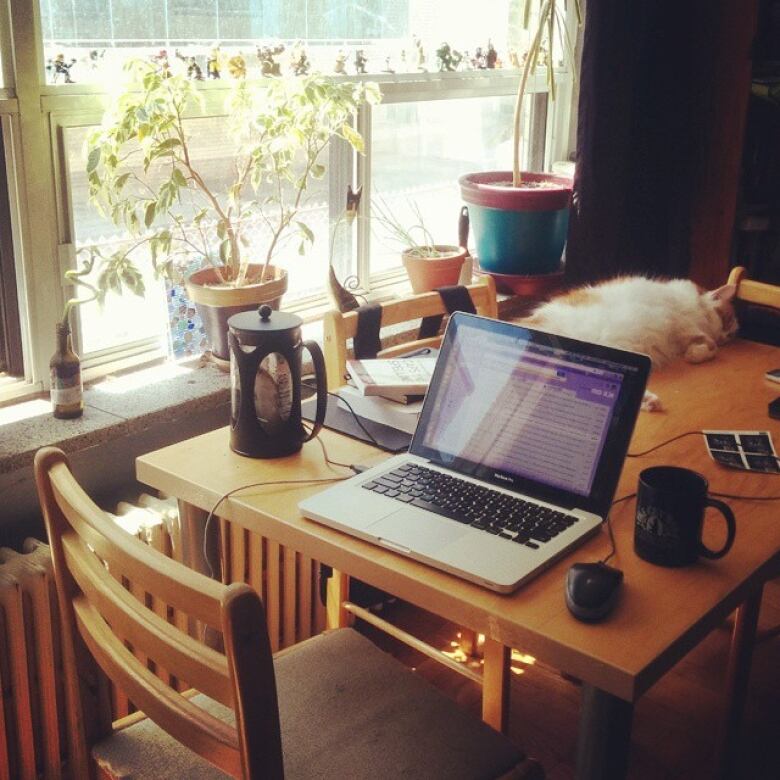Home-office tax writeoffs can save you money
Deductions on rent, hydro and even cleaning are available if you work mostly from home

There are a lot of benefits to working from home no commute, time with family, and if you're savvy, big savings come tax time.
- Home-office tax writeoffs can generate big savings
- Home office expense claims coming under closer scrutiny
- When your car is your office, you've got tax-time complications
In 2014,780,690 tax filers took advantage of home office deductions not including those who manually completedpaper returns, which are not included in the CRA's data on home office claims.
But how much you can claim depends on your situation. Here's an overview of what you can expect from the taxman when going home at night means moving from the desk to the couch.
Do you qualify?
According to the Canada Revenue Agency, to apply for home-office deductions you must meet at least oneof thefollowing criteria:
- You do more than 50 per cent of your work at home.
- You use yourhome workspace exclusivelyto earn employment income,and you regularlymeet clients or customers there.
So if you have a permanent employer, working at home a few days a week at thekitchen table won't cut it.
"That is not a place that is used exclusively for the purpose of earning income.That right away, I think, would eliminate a lot of people,"JasonSafar, a tax partner with PwC, told CBC News.
Increasingly people work on laptops and by mobile, but not everybody's living in a mansion. If you don't have a separately carved out office area, you're out of luck, he added.
Employees
If you do manage to meet thecriteria,you'll need to get your employer tosign aT2200federal formcertifying that fact. If the company won't sign, you can't claim.
Once your paperwork is in order,you can write off apercentage of the cost of maintaining the workspace, such as heating, electricity, minor repairs and cleaning.
A percentage of rental payments can also be deducted, but if you own the home, you can't claim mortgage interest, property taxes, home insurance or capital cost allowances.
There is an exemption for sales people who work on commission, who areallowed to deduct a pro-rated portion of their home insurance costs and property taxes.
Self-employed
If you're your own boss, you have far more togain.
Inaddition toexpenses, youcan also claim a portion of home insurance, internet services, property taxes and mortgage interest costs (but not the part of the mortgage payment that is a repayment of principal).
This is something that does get selected for review by the CRA, so you want to make sure that you do have adequate documentation of these costs.- Brett Crawford, Grant Thornton
Self-employed workers can also claim capital cost allowance, known as depreciation,on the office portion of their home but there could be negative tax implications if you ever decide to sell.
"If you do not claim depreciation, your entire house may be regarded as your principal residence and any gain realized on its eventual sale may be tax-free," according to the2015-16 tax guide fromGrantThornton.
Calculating your deductions
Whatever your situation, you can only claim expenses that relate to your work.If you're not clear what that entails,just try to be reasonable,Safar says.
"When you're dealing with folks from the CRA, the auditors, they're really reasonable people,they're normal people," he said. "So you have to becomfortablesitting downacrossthe table fromsomebodyand explaining tosomebodywhy this is a reasonable expense."
Tocalculate what you're owed, you'll need to determine what percentage of your home you use to earn income. For example, if your home office takes up 10 per centof the total square footage of your home, youclaim 10 per cent of yourexpenses.
The taxman will notice if you go overboard with this estimate,saysBrett Crawford, senior manager of tax services at Grant Thornton.

If your office space doubles as a personal space but it's still your primary work area TurboTax recommends calculatingthe amount of hours per day you use it forbusiness, anddividingit by24.
If you work 12 hours per day,and use the space for personal reasons the rest of the time,you have to reduce your home-office deduction by 50 per cent.
Any expenses that relate directly to the home office like a separate phone line or office supplies can be deducted in full.
Keeping detailed records of all your expenses is key, Crawford says.
"This is something that does get selected for review by the CRA, so you want to make sure that you do have adequate documentation of these costs."
But wait, there's more
There are some caveats to home-office deductions.
You can only claim them on out-of-pocket costs. If your employer or client reimburses you for some expenses, keep those off your tax return.
And you can't use tax writeoffs to create a business loss.But eligible expenses that can't be claimed one year can be carried forward to future years.












_(720p).jpg)


 OFFICIAL HD MUSIC VIDEO.jpg)
.jpg)



























































































